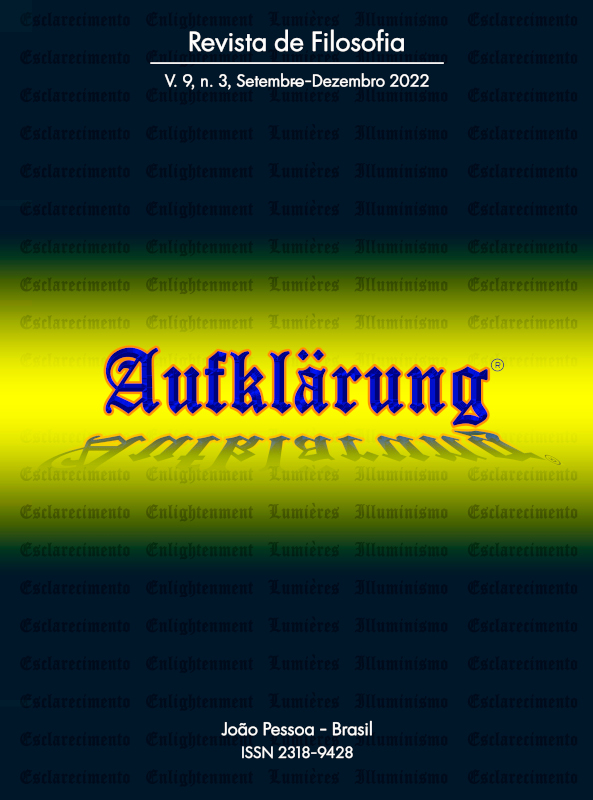Theory of Thomas Aquinas on human nature and its meaning in social life today
DOI:
https://doi.org/10.18012/arf.v9i3.65673Keywords:
Aquinas, believers, human nature, reason, rationalAbstract
A globalização está se intensificado cada vez mais, e, em igual escala, as pessoas se especializam em suas atividades. Nesse processo, observamos que os indivíduos mantém relações tanto material quanto espiritualmente entre si. Na medida em que a sociedade evolui, as pessoas desenvolvem novos tipos de relação, ampliando suas formas de conhecimento do mundo. Este artigo aborda, a partir do pensamento de Santo Tomás de Aquino, o conceito de natureza humana. Para nossa pesquisa, usamos o método analítico, o poder de síntese e de argumentação para explicar a natureza humana com seus comportamentos e percepções; Tomás afirma que é próprio da natureza humana agir corretamente com o fim de alcançar a felicidade como bem maior. Apesar disso, a sociedade evolui mais rapidamente e injustiças e desigualdades sociais, inevitavelmente, aparecem. Desejando que suas vidas sejam boas e felizes, e não alcançando tal fim com facilidade, as pessoas se deprimem. Isto nos faz assumir a posição de que, em uma sociedade organizada, as pessoas tendem a agir corretamente, quando baseadas em leis e regras claras, e, com isso, conseguem ser mais organizadas e eficientes em suas ações. E isso torna-se a base para a construção de uma sociedade melhor no Vietnã.
Downloads
References
Aertsen, Jana. "Aquinas's Philosophy in Its." The Cambridge Companion to Aquinas (1993): 12.
Aroney, Nicholas. "The Social Ontology of Human Dignity." Paper presented at the IVR World Congress of Philosophy of Law and Social Philosophy, Lucerne, Switzerland, 2019.
Arthur, James, Liam Gearon, and Alan Sears. Education, Politics and Religion: Reconciling the Civil and the Sacred in Education. Routledge, 2010.
Cali, Carmelo. "Representation, Internal." In Glossary of Morphology, 451-54: Springer, 2020.
Csák, János. "Social Futuring–a Normative Framework." Society and Economy 40, no. s1 (2018): 21-45.
Di Ceglie, Roberto. Aquinas on Faith, Reason, and Charity. Routledge, 2022.
Finnis, John. Natural Law and Natural Rights. Oxford University Press, 2011.
Gibbs, Paul, Jill Jameson, and Alex Elwick. Values of the University in a Time of Uncertainty. Springer, 2019.
Grassl, Wolfgang. "Aquinas on Management and Its Development." Journal of Management Development (2010).
Haldane, John. "Philosophy in Relation to Other Disciplines Exploring Human Nature." Metaphilosophy (2022).
Hittinger, Russell. "The Recovery of Virtue: The Relevance of Aquinas for Christian Ethics." Faith and Philosophy 8, no. 4 (1991): 549-54.
. Horvat, Saša, Piotr Roszak, and Brian J Taylor. "Is It Harmful? A Thomistic Perspective on Risk Science in Social Welfare." Journal of religion and health (2021): 1-15.
Jenkins, John I. Knowledge and Faith in Thomas Aquinas. Cambridge University Press, 1997.
Johnson, Wayne Gustave. Understanding Morality: Quests for the Good Life. Wipf and Stock Publishers, 2022.
Keys, Mary M. Aquinas, Aristotle, and the Promise of the Common Good. Cambridge University Press, 2006.
Murphy, Mark C. "Natural Law Theory." The Blackwell guide to the philosophy of law and legal theory (2005): 15-28.
Naus, John E. The Nature of the Practical Intellect According to Saint Thomas Aquinas. Gregorian Biblical BookShop, 1959.
Ozoliņš, Jānis T. "Aquinas, Education and the Theory of Illumination." 967-71Taylor & Francis, 2021.
Pasnau, Robert, and Robert Charles Pasnau. Thomas Aquinas on Human Nature: A Philosophical Study of Summa Theologiae, 1a 75-89. Cambridge University Press, 2002.
Perler, Dominik. "Rational Seeing: Thomas Aquinas on Human Perception." In Medieval Perceptual Puzzles, 213-37: Brill, 2019.
Ramsay, Hayden. "Conscience: Aquinas—with a Hint of Aristotle." Sophia 40, no. 2 (2001): 15-29.
Reyna, Zachary Low. "Aquinas's Ecological Vision: Natural Law and Friendship in Contemporary Environmental Political Thought." New Political Science 40, no. 1 (2018): 15-32.
Rhonheimer, Martin. "St. Thomas Aquinas and the Idea of Limited Government." Journal of Markets & Morality 22, no. 2 (2019).
Schaff, Philip. History of the Christian Church. Vol. 3: C. Scribner, 1867.
Stump, Eleonore. Aquinas. Routledge, 2008.
Tück, Jan Heiner. A Gift of Presence: The Theology and Poetry of the Eucharist in Thomas Aquinas. CUA Press, 2018.
Additional Files
Published
How to Cite
Issue
Section
License

This work is licensed under a Creative Commons Attribution 4.0 International License.
Journal general policy
1.This journal works under a Creative Commons License aplied to online journals. That icence can be read in the following link: Creative Commons Attribution 4.0 International (CC BY 4.0).
2.Accordingly to this License, a)the journal declares that authors hold the copyright of their articles without restrictions, and they can archieve them as post-print elsewhere. b)the journal allow the author(s) to retain publishing rights without restrictions.
Metadata Policy for information describing items in the repository
1. Anyone may access the metadata free of charge at anytime.
2.The metadata may be re-used in any medium without prior permission, even commercial purposes provided the OAI Identifier or a link to the original metadata record are given, under the terms of a CC BY license refered for the Journal.







































